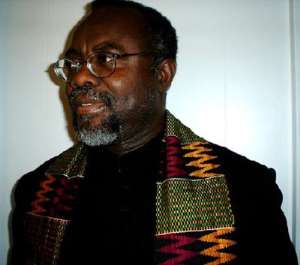
The name Kumbungu, a township of some three communities in the Northern Region of Ghana, reminds me of the name of the legendary independent African Christian religious leader, Prophet Simon Kimbangu (1887-1951), who met with gross ill-treatment at the hands of the Belgian colonial authorities in present-day Democratic Republic of the Congo (DRC), because Prophet Kimbangu was envisaged to be seriously undermining the slavocratic foundations of European imperialism in Central Africa.
The story is told of how one day, this British-trained Baptist minister and healer told some European-Christian missionaries in his country that if God, or Divine Providence, wanted to redeem His/Her people from their wayward ways, he would not send anybody from outside their society. Instead, Prophet Kimbangu had insisted that if Divine Providence desired to redeem His/Her people, S/He would raise a Redeemer from among the target or subject people.
When approximately 1,000 citizens of Kumbungu decided last September, in the lead-up to the 2016 general election, to defect from the then-ruling National Democratic Congress (NDC), led by the self-proclaimed “Northern Development and Prosperity Star,” “Northern Star,” for short, to the then-Candidate Akufo-Addo-led main opposition New Patriotic Party (NPP), I had the same feeling, which was that the children of the Lost House of Dombo were finally finding their way back to the ideological camp to which they had always belonged, the NPP. Of course, by the latter abbreviation, I was actually thinking about the Northern People’s Party, that seminal political organization that brought many a northern-descended colonial Ghanaian, or properly speaking Gold Coaster, into the mainstream of Ghanaian politics. Well, when they auspiciously defected, I thought it was a major blow to the already fast-waning fortunes of the Mahama presidency, although it would be “Wonder Boy” Ras Mubarak, the Executive Director of the National Youth Authority (NYA), who would go on to clinch the Kumbungu parliamentary seat for a nationally routed National Democratic Congress.
Even so, it clearly appears to have been somewhat of a proverbial Baptism-of-Fire for Mr. Mubarak. Recently, the nephew of Mr. Mohammed Muntaka Mubarak, the Chief Minority Whip of the main opposition National Democratic Congress, was widely reported by the media to have cautioned his fellow Members of Parliament against the gross exhibition of arrogance and political insensitivity towards their constituents, if they wished to hold onto their seats for any considerable temporal span. It was decidedly a good advice but, nevertheless, a self-interested one, if the dear reader were to ask me.
In a statement seeking to justify the decision of the 1,000-plus Kumbungu members of the National Democratic Congress to cross over to the New Patriotic Party, which clearly appeared to be on the cusp of clinching a decisive victory in Election 2016, at least as indicated by the proverbial handwriting on the wall, the spokesman for the group, Mr. Mahama Seidu, gravely noted that, among a legion of other needs, “the lack of electricity and a phenomenally high rate of youth unemployment” had pushed them out of the National Democratic Congress and into the fold of the New Patriotic Party.
“We have been voting for the NDC since 1992 in these three communities [namely, Kumbungu-Kukuo, Yipeli-Naayili and Duli-Zugu] with more than 600 households, and we have been knocking on the doors of the NDC party operatives to meet our demands all to no avail” (See “Over 800 NDC Members in Kumbungu Join NPP” Citifmonline.com / Ghanaweb.com 9/12/16). Ras Mubarak may be right as far as the behavior and attitude of MPs towards their constituents are concerned. Ultimately, though, it is the ability of the sponsoring party of these MPs to deliver and deliver promptly that matters most.
The caption of “Beneficent Winds of Kumbungu” is, of course, an obvious take or evocation of the immortalized wind of change of British Prime Minister Harold MacMillan in the wake of Ghana’s reassertion of her sovereignty from British colonial domination in the late 1950s. In Ghana, these days, the wind of change tends to blow in the direction of political parties of visionary leaders who have the interests, wishes and aspirations of their constituents foremost at heart.
*Visit my blog at: kwameokoampaahoofe.wordpress.com Ghanaffairs




 This IMANI job no dey pap; the people you are fighting for are always fighting y...
This IMANI job no dey pap; the people you are fighting for are always fighting y...
 Prof. Naana Opoku-Agyemang has changed; you can see a certain sense of urgency –...
Prof. Naana Opoku-Agyemang has changed; you can see a certain sense of urgency –...
 MFWA Executive Director slams Akoma FM for engaging in ‘irresponsible’ media pra...
MFWA Executive Director slams Akoma FM for engaging in ‘irresponsible’ media pra...
 ‘Women must become millionaires too’ — Prof Jane Naana on establishment of Women...
‘Women must become millionaires too’ — Prof Jane Naana on establishment of Women...
 Some believe only in Ghanaian votes, not Ghana — Kofi Asare jabs politicians
Some believe only in Ghanaian votes, not Ghana — Kofi Asare jabs politicians
 Plan to make BEST sole aggregator of Sentuo Oil Refinery will create market chal...
Plan to make BEST sole aggregator of Sentuo Oil Refinery will create market chal...
 2024 elections: I can't have the man I removed from office as my successor — Aku...
2024 elections: I can't have the man I removed from office as my successor — Aku...
 2024 Elections: Immediate-past NPP Germany Branch Chairman garners massive votes...
2024 Elections: Immediate-past NPP Germany Branch Chairman garners massive votes...
 Gov’t focused on making Ghana energy self-sufficient, eco-friendly – Akufo-Addo
Gov’t focused on making Ghana energy self-sufficient, eco-friendly – Akufo-Addo
 April 25: Cedi sells at GHS13.74 to $1, GHS13.14 on BoG interbank
April 25: Cedi sells at GHS13.74 to $1, GHS13.14 on BoG interbank
